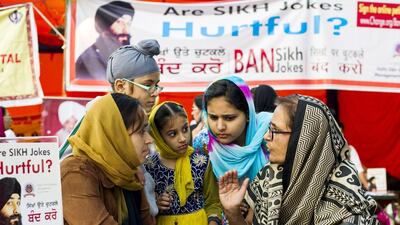NEW DELHI // For years, Harvinder Chowdhury has represented underdogs in court cases: women in abusive marriages, or poor men wrongly accused of crimes. But she may, in the future, be best remembered as the lawyer who could not take a joke.
Last month, Ms Chowdhury filed a petition before the Supreme Court, asking for a ban on the dissemination of Sardarji jokes — jokes that poke fun at Sikhs. Sardarji jokes are popular in India, but Ms Chowdhury — a Sikh herself — argues that they paint her and other Sikhs as “persons of low intellect, stupid and foolish.”
A two-judge bench will begin hearing arguments in the case on January 4.
Based on common stereotypes, Sardarji jokes — named after an alternative word for the Sikhs of Punjab — lampoon the supposedly slow wits of Sikhs.
In the petition she personally filed, Ms Chowdhury provided examples of such jokes, culled from joke books or the internet.
One typical joke involves a Sikh conversing with his boss. “Where were you born?” the Sikh is asked. “India,” he replies. “Which part?” the boss asks in response. The Sikh, puzzled, answers: “Which part? My whole body was born in India.”
Such jokes ride on the friendliness of the Sikh community, and its willingness to laugh at themselves. In fact, the deepest repository of Sardarji humour, at least in print, is the set of joke books, running into nine volumes, compiled by the noted Sikh littérateur Khushwant Singh.
“The Sikh community is known for [its] sense of humour, and they themselves might object to this petition,” TS Thakur, one of the two Supreme Court justices who will hear Ms Chowdhury’s case, said when the bench accepted the petition.
Jawaharlal Handoo, a scholar of folklore at the Central Institute of Indian Languages in Mysore, thinks that this genre of humour emerged soon after India became independent. "Punjab was in a crisis," Dr Handoo told The National. "A lot of Sikhs migrated from Pakistan to India, so small frictions emerged between the new arrivals and local communities."
Through the next few decades, the Sikhs prospered as agriculture in Punjab boomed. Simultaneously, a movement for a separate Sikh homeland — now quelled — began to surface, provoking further anxiety. “A joke is basically anxiety,” Dr Handoo said. “That’s why the Sardarji jokes became so popular.”
In a way, the fact that such jokes even emerged was a “testament to how successful and important Sikhs became,” Dr Handoo added. “I wish there were jokes about me. But there aren’t. There aren’t jokes about the Handoos because they aren’t important.”
But Ms Chowdhury rejects this theory, arguing that making a community the butt of jokes belittles them.
In her own life, she said, she has faced scorn or insults for being Sikh, and these stemmed directly from the “mentality behind these jokes.”
Since these jokes already deride Sikhs — perhaps more than any other Indian community — people readily extend the humour into the terrain of scorn and insult.
"When my son was very young, just a few days old, I had to go to Tihar Jail for some work, so I had to take him along," Ms Chowdhury told The National. "He was sleeping, so I left him in a room there and did my work."
For that, she said, she faced ridicule. “People said: ‘Oh look, the Sardarni took her baby to jail!’” she said, using the term for a female Sikh.
The comments implied a certain foolishness or stupidity on Ms Chowdhury’s part, which she claimed was related to her Sikh identity.
“That’s the kind of mockery I faced.”
Ms Chowdhury mentioned several other incidents. “In court, lawyers would make fun of Sikhs, and I’ve even had occasion to slap a couple of them,” she said. “My son, who is a tall boy and has a healthy appetite, keeps getting mocked for it. His schoolmates say that he’s a Sardarji who’ll eat anything.”
In the internet age, the volume of these jokes has proliferated.
Some humour web sites, such as SantaBanta.com, were founded on a bedrock of Sardarji jokes. Jokes are frequently forwarded on Whatsapp and email. “When the process is this continuous, it seeps into your subconscious,” Ms Chowdhury said. “So even those who know better start to unconsciously think and say things in this way.”
“It’s demoralising. It hurts our creativity. I keep thinking: ‘If I make a mistake, what kind of comments will other people make?’”
Ms Chowdhury claims that she has enlisted 27,000 people to sign a petition, which will be presented to the court in January.
Other Sikhs have spoken out in support of Ms Chowdhury. On the news website Scroll, a Sikh named Parampal Singh Syan argued that India needs to stop laughing at essentially crass jokes.
“Free speech is great but respect and empathy are an even bigger cornerstone of civilisation,” Mr Syan wrote. “When free speech is intended to hurt or hurts, then it must be confiscated until the impressionable little child grows up and understands the responsibilities that come with freedom.”
But Dr Handoo said that the petition was unfortunate.
“Humour cannot be the Supreme Court’s jurisdiction,” he said. “It is not their business.”
“The essence of this jokes lies in their orality, in any case,” he observed. “You narrate to friends so that you can laugh together. And no court can put a stop to that.”
ssubramanian@thenational.ae

